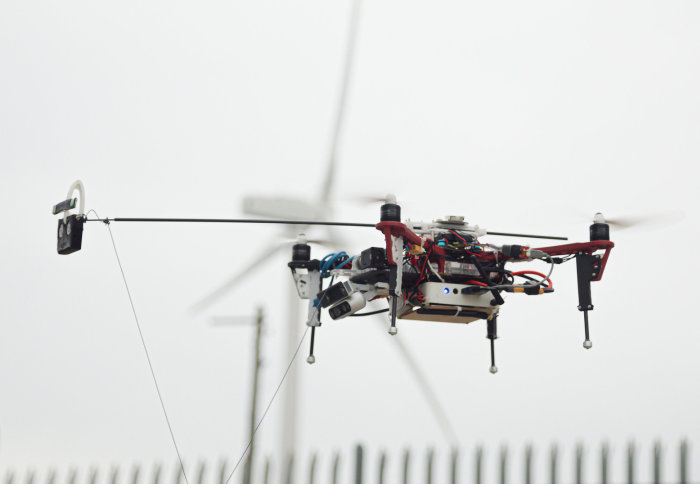Flyby fixers and customer care: News from the College

Image: ORCA Hub
Here’s a batch of fresh news and announcements from across Imperial.
From a new drone for fixing windfarms, to an exploration of customer feedback, here is some quick-read news from across the College.
Flyby fixers

Imperial’s Aerial Robotics Lab has been instrumental in launching a new type of drone that could fix wind farms without human help.
The Lab is part of the international Offshore Robotics for Certification of Assets hub (ORCA) which has developed a four-legged robot called Anymal that can walk around and replace humans on remote oil rigs or wind farms to perform maintenance tasks.
The drone is equipped with a robotic arm that can attach itself to vertical structures, such as a wind turbine, to inspect it, hook onto a sensor, or carry out reparations independently.
Lab lead Dr Mirko Kovac said: “The robots can visually inspect a turbine for integrity concerns and make contact, placing sensors on the infrastructure, or acting as a sensor itself, to assess the health of each asset.
"Our technology could even deposit repair material for certain types of damage. This has far reaching applications including removing the need for humans to abseil down the side of turbines which can be both dangerous and expensive."
Image credit: ORCA Hub
Leverhulme Trust prizewinners
Two researchers from the Department of Chemistry and one from the Department of Chemical Engineering have won Philip Leverhulme Prizes for 2019. The prizes are awarded annually by the Leverhulme Trust, providing winners with £100,000, which can be used over two or three years to advance their research.
Dr Kim Jelfs uses computational methods to accelerate the discovery of new molecular materials, including porous materials and organic electronics.
Dr Artem Bakulin uses ultrafast lasers to understand the dynamics of systems at the nanoscale, including news forms of solar cells, quantum dots and artificial photosynthesis.
Dr Camille Petit designs, synthesises, characterises and tests porous materials – those with tiny holes that allow fluids to pass through. These can be used to separate chemicals, with applications in environmental, water and energy sustainability.
Read more on the Leverhulme Trust website.
Chemical accreditation

Professor Molly Stevens, of the Departments of Bioengineering and Materials, has won an award for outstanding scientific contributions to colloid chemistry – a field that uses tiny particles to address real-world issues.
The award recognises Professor Stevens’ use of nanomaterials for disease biosensing, drug delivery, and point of care diagnostics, using easy-to-use and cost-effective devices that can bring advanced technology to low income settings.
Professor Stevens said: “On behalf of my team, I am absolutely delighted to receive this award! It recognises the fantastic work of my group of talented postdocs and students over the past 15 years. The applications of our work are early detection tests for triaging hospital patients, or smartphone enabled tests for surveillance of infectious diseases in remote locations.”
Pathogen and disease vector informatics
 Two vast repositories of genetic information about human disease drivers and carriers have merged with a new $38.4 million contract to help maintain them and make them accessible to scientists worldwide.
Two vast repositories of genetic information about human disease drivers and carriers have merged with a new $38.4 million contract to help maintain them and make them accessible to scientists worldwide.
The databases include information on microbial pathogens, including the parasites responsible for malaria, sleeping sickness and toxoplasmosis; fungi responsible for thrush, aspergillosis and Valley Fever; and vectors of human pathogens such as ticks and mosquitoes that transmit illnesses such as Zika, yellow fever, and Lyme disease.
The combined data resources, to be known as VEuPathDB, will enable researchers to seek patterns that may explain important diseases, identify drug and vaccine targets, and lead to more effective vector control measures.
The databases, known as Bioinformatics Resource Centers, were set up by the University of Pennsylvania, the University of Georgia and the University of Notre Dame, and include Imperial College London as a partner.
Read more about the merger.
Balancing customer feedback

Though the idea that the customer is always right has come to be one of the fundamental principles of the business world, customer feedback should only be seen as one side of the story.
The impact that customer participation can have on staff may cause them to feel alienated and can create mistrust between staff and the company.
A new IB Knowledge article shows that balancing both sides will yield the best possible experience for staff, and therefore, a more positive customer experience as well.
Read the full article: Why customer feedback should only be considered as one side of the story
–
Want to be kept up to date on news at Imperial?
Sign up for our free quick-read daily e-newsletter, Imperial Today.

Article text (excluding photos or graphics) © Imperial College London.
Photos and graphics subject to third party copyright used with permission or © Imperial College London.
Reporter
Alix Goodwin
Academic Services
Hayley Dunning
Communications Division
Andrew Youngson
Communications Division
Caroline Brogan
Communications Division


